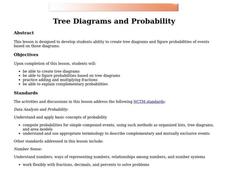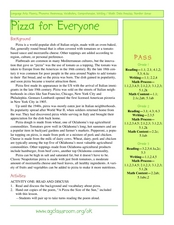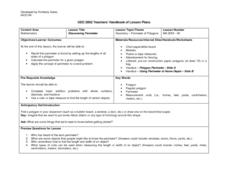Curated OER
Using Integer Tiles
Demonstrate how to add and subtract positive and negative numbers using tiles. Pupils complete a variety of activities on a worksheet, including mixed addition and subtraction problems, subtracting and adding opposites, and magic squares...
Curated OER
Egyptian Fractions
Sixth graders take a brief look at what is known about Egyptian Fractions. These are unit fractions - fractions whose numerator is one. We look at how fractions can be represented in terms of Egyptian Fractions. Finally we suggest a web...
Curated OER
Fractions: Addition and Subtraction
Seventh graders add and subtract fractions with like and unlike denominators. After discussing the use of fractions in the real world, 7th graders work problems and draw models representing each problem. They observe subtracting...
Curated OER
Subtracting Fractions
Students investigate the concept of subtracting fractions. They use a variety of problems in order to practice new skills. The independent practice is used to obtain an informal measurement of mastery with the use of a formal quiz for a...
Curated OER
Adding And Subtracting Fractions
Fifth graders practice adding and subtracting fractions in this Math lesson for the fifth grade classroom. The lesson uses a word problem involving snack food ingredients that is sure to please any hungry student. State standards for...
Curated OER
Integers and Fractions
Students perform operations using positive and negative numbers as well as operations with fractions in various forms. They identify common decimals and their fraction equivalents while converting fractions to decimal form.
Hawaiʻi State Department of Education
Rhythm Patterns
Fractions can be tricky. Why not have kids think of fractions like they think of eighth, quarter, and half notes? In teams, the class creates four-measure patterns with their percussion instruments. They need to explain their rhythm...
Illustrative Mathematics
Operations on the Number Line
A different way to look at integers is on this number line with variables in place of numbers. Learners are to look at different expressions and describe why they think the answer would be positive or negative, depending on the location...
Curated OER
Basic Sense
Fifth graders add fractions. After a class discussion on real life application of fractions, the teacher uses fractions strips to model adding fractions. In pairs, 5th graders model adding fractions by drawing diagrams. They justify...
Curated OER
Fraction Food Frenzy
Students study addition of fractions with like denominators using illustrations and problem solving.
Curated OER
Quilting with Middle School Students: Using Proportionality to Develop Quilt Designs
Learners use quilt patterns to illustrate ratios. In this fractions activity, students color quilt patterns using given fractions and ratios of colors. A finished "quilt" is assembled from the work of the learners. This is an...
Curated OER
Adding Ten Tiles I
Students practice this problem that needs a certain amount of experimentation (trial and error) to get any answer at all. In the process they practice their basic number facts. However, to get the complete set of answers Students need to...
Curated OER
Proportional Problems 1
Eighth graders explore representing fractions as ratios and proportions. They model proportions through the use of blocks, LEGO gears and activities with bicycle gears and pedals. Students work with bicycle gear boxes to observe and...
Shodor Education Foundation
Tree Diagrams and Probability
Aspiring statisticians create tree diagrams and figure probabilities of events based on those diagrams. They practice adding and multiplying fractions and explain complementary probabilities. Students use computers activities to make...
Curated OER
Constructing My Sundae
Eighth graders investigate concepts related to fractions. This includes adding, subtracting, and reducing. There is a creative worksheet that has them creating their own ice cream sundaes using fractions.
Curated OER
Counting on Counting
Students recognize that counting tells how many objects are in the set irrespective of how they are arranged or the order in which they are counted. They solve problems involving one more or less to a given set using their knowledge of...
Curated OER
The Tic Tac Equation
Students use an equation to solve a problem of applied mathematics. The problem involves using the dating practices of teenagers to create a context. They use an equation to find the solution of how many kisses can be obtained with the...
Curated OER
Pizza for Everyone
Pizza is the inspiration for the cross-curricular lesson detailed here. Start out with a poem about pizza and move into a discussion about balanced eating. To close the language arts portion of the lesson, ask your pupils to write...
Curated OER
Activity #8 Simulation of Oil Spills
Students conduct an experiment to simulate an oil spill and identify the characteristics of oil in water. They evaluate the effectiveness of various cleanup methods. They discuss the how to clean up an oil spill, and what causes oil...
Curated OER
Discovering Perimeter
Twelfth graders apply perimeter measurement to items found in newspapers and calculate the cost in terms of feet or yards. They share answers and explanations with classmates.
Curated OER
Skip it to multiply it
First graders make sensible estimates and check the reasonableness of answers.
They make up, tell and record number stories up to 9 about given objects. They skip count in twos, threes and fives.
Curated OER
Let's Share Equal Parts
Students practice creating parts of a whole by using educational software to illustrate their learning.
Curated OER
Rabbits
Students review what they think doubling means and double numbers mentally, for example, 5, 12, 16. They share their solutions and discuss how they doubled. They work together on a problem that is beyond mental working and solve...
Illustrative Mathematics
Illustrative Mathematics: Finding Common Denominators to Add
Part (a) of this task asks students to find and use two different common denominators to add the given fractions. The purpose of this question is to help students realize that they can use any common denominator to find a solution, not...























